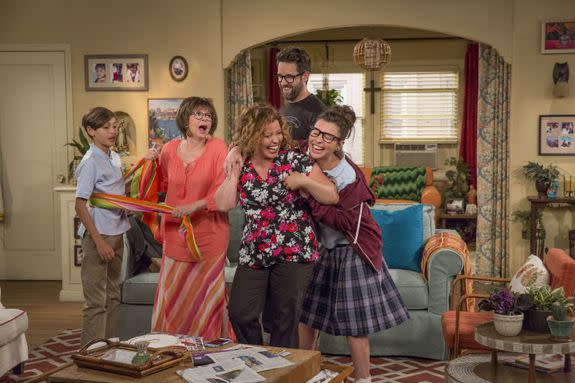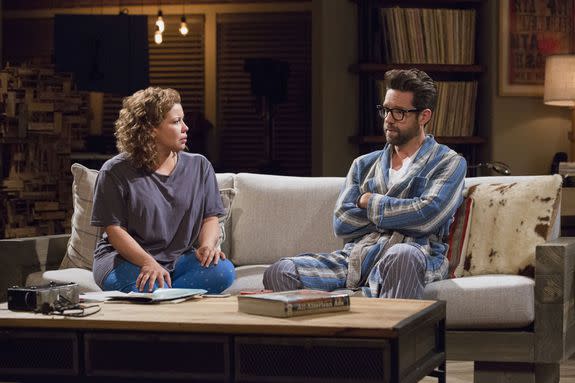How 'One Day at a Time' perfectly summarizes how the Latinx community deals with mental health

One Day at a Time provides us with quick punchlines and light-hearted moments of a 21st century Latinx family. But it also takes a closer look at how one family deals with the struggles of mental health.
The Netflix sitcom (a remake of the 1975 show) comes at a time where representation is strongly needed. It also presents current social issues like immigration, gun rights, and LGBTQ+ issues in a way that TV has never shown Latinxs address. The creators strive to develop these narratives sensitively, and also showcase the main character's journey to understanding her mental health.
SEE ALSO: How 2018 can be the year for Latinx representation
The writers portray struggles with mental health in a way to provoke more dialogue around the taboo subject in the Latinx community. Cultural factors like religious beliefs, family dynamics, and generational divides can make it difficult to talk openly about mental illness — and might influence how families interact, cope, and ask for help.
In the episode "Hello Penelope," Penelope Alvarez (Justina Machado) feels ready to live without therapy and medication, things she once relied on to treat her depression and anxiety. The single mom of two, who previously served in the military, is encouraged by the good things happening in her professional and personal life which includes a brand new relationship, stable family-work balance, and a positive state of mind. Without consulting her doctor, she makes the decision to stop attending therapy and taking antidepressants. She soon learns the deeply negative side effects to this decision.
Penelope's sensitive and relatable story can hopefully inspire a broader conversation in the Latinx community to break stigmas around mental health.
The influence of pop culture

Image: Michael Yarish / Netflix
Even if it’s not commonly portrayed on television, Penelope’s journey can feel familiar to many viewers. One in five adults have a mental health condition in the United States, and 16 percent of Hispanic people live with a mental illness, according to National Institute of Mental Health.
Anxiety, major depression, PTSD, and alcoholism are among the most common of mental health issues in the Latinx community.
One Day At A Time connects Penelope's mental health to everyday, relatable obstacles. She juggles a full-time job, school, and is the family’s breadwinner. She also becomes mired in self doubt about the choices she makes and whether she's doing the right things for her family. Her doubt makes it harder to function and navigate through daily responsibilities. The more she reflects on her life, the more Penelope feels compelled to distances herself from the outside world after stopping treatment. Since she's the main provider, very independent, and stubborn, the character is less inclined to ask and rely on others for help.
Michelle Badillo, One Day at a Time writer and co-writer of the "Hello Penelope" episode, hoped it would dismantle misconception and shame around mental health. To her, It was an opportunity to set the example for future generations to learn how to approach the topic.
"I think pop culture needs to continue to bring light to mental health issues,” Badillo said. “We still don't talk about mental health enough, and when we do, many of us are misinformed, and we can definitely use TV to rectify that."
Badillo and the episode’s co-writers relied on personal experiences to draw inspiration for the storyline.
America Paredes, senior director of partnerships and community at Mental Health America, said negative portrayals of mental illness can be harmful because viewers "internalize the way it's depicted and feel less inclined to actually recognize the symptoms." Instead they may hesitate to open about their experience for fear of being judged. One Day at a Time fearlessly dives into the many layers of Penelope's mental health and how it affects and her interaction with family and friends.
The generational divide
In "Hello Penelope," Penelope’s mother, Lydia, shares her own skepticism of Penelope’s mental health issues.
Lydia (Rita Moreno) doesn't understand why Penelope went to therapy (calling it the "cuckoo party"), why she took antidepressants ("It's humiliating."), and why Penelope was upset when it seems her life is going so well. At one point, Lydia tries to use homemade food to ease Penelope’s pain. The traditional home remedies, and negative connotations, didn't motivate the daughter to open up to her mother.
"A large part of it is a negative stigma attached to [mental health] and [it] relates back to the very cultural aspects of what it is to be a part of the Latino community, where it's much more collectivistic,” said Paredes. “One thing is that it doesn't impact the individual, but the whole family."
In Latinx communities, the older generation focus on providing food, shelter, and care for the family. Paredes points out older Latinxs prioritize responsibilities over emotional distress because of the heavy emphasis on the "needs of the larger family connections." As a result, the younger generation might keep their struggles private due to the stereotypes around mental illness.
While Penelope's behavior changes throughout the episode, Lydia doesn’t know the signs and symptoms of mental illness, like her daughter's lack of appetite, sleeping in all day, and unwillingness to participate in activities. Worried about her daughter, she instead seeks guidance from the church. Lydia's priest suggests Penelope work through it on her own. He believes Lydia should give her daughter space and time to confine in her.
"We wanted to highlight both sides because that dynamic rang true to us as a real family dynamic, particularly in Latino families," Badillo said. "And we like to have our characters have real, compassionate conversations about all sides of an issue so that hopefully we can help start those conversations in real life.”
Both Paredes and Badillo singled out common themes that come up in conversation about mental health in Latinx families, like, “What is there to be depressed about? You have a roof over your head, food on the table,” or “Don't mention it. It's not a thing.” While these comments function like a defense mechanism for many people, Paredes and Badillo said they can also make mental health too painful or shameful to discuss.
In the episode, Penelope channels these misconceptions and doesn't tell her boyfriend about the antidepressants. Once she stops her medication, she distances herself from him.
"What I see in that episode is the fact that one individual is dealing with mental health issues, but the impact of the mental health issues affects family structure," Paredes said. "Each family member is going to have to figure out how to actually navigate the different feelings that they have going."
Lydia comes to terms that her perception on mental health is not universal. She has to accept Penelope's decisions can't be influenced, judged or cured by home remedies. She may not believe in everything Penelope does, but she cares too much for her daughter to not be by her side through it all.
Understanding the options

Image: Mike Yarish/Netflix
In Penelope’s last group therapy session, before deciding to go off her medication, the therapist talks about coping tools like meditation, exercise, and volunteering. She provides these options as an addition to therapy and medication. The therapist also suggest documenting their thoughts as an act of self-care or, in this case, self-talk (identifying the source of all the negativity and rewriting your thoughts into positive affirmations). Penelope thought the idea was silly.
During her lowest point in the episode, she took the tool into consideration and was more inclined to share her thoughts with her friend Schneider (Todd Grinnell) toward the end of the episode. Her thoughts were mixed with fear, sadness, and guilt.
Although Penelope realizes it wasn't the best option to stop taking her medication, she doesn't want to depend on them for happiness. Schneider decides to tell her a story about his issues with alcohol and drugs. At the time, he believed one drink was OK and his addiction was something he can control. Instead his addiction prevented him from making healthy decisions.
"There's something I want that I can't have for the rest of my life. And there's something you don't want that you have to have for the rest of yours," Schneider told Penelope to help her reconsider the benefits of treatment.
Penelope goes back on her medication and returns to group therapy again. She tells her boyfriend about her antidepressants and was surprise he didn't have a problem with it. The episode ends on a positive note and gives viewers a chance to reflect on how the sensitive subject can be discussed more openly and without judgement.
Reflecting and moving forward
Paredes said that it’s essential to talk about mental health in the Latinx community in way that reflects the unique cultural and social dynamics at play. The cost of treatment is a big factor in when and how people access treatment; only 31 percent of Hispanics received treatment for mental illness in 2016. And people seeking help might be discouraged if they can’t find a culturally-sensitive provider.
"Having someone that speaks Spanish is critical,” said Paredes. “Having someone that looks like me, Hispanic, is really important in helping people. It's not just an idea or that it's only a 'white thing.’”
Paredes said that the One Day at a Time episode opened doors for bigger discussions about mental health in the Latinx community. (The show also received an award in 2017 from Mental Health America for its representation of mental illness). Even the show’s writers felt personally affected by the episode after it aired.
"My writing partner and I both realized we needed to go back to therapy," Badillo said. "I think, like Penelope did, it's easy to drop your mental health routine when you feel good. And writing the episode was a great reminder not to do that."
If you're seeking mental health resources, check out the National Institute of Mental Health and the National Alliance on Mental Illness for more information.
